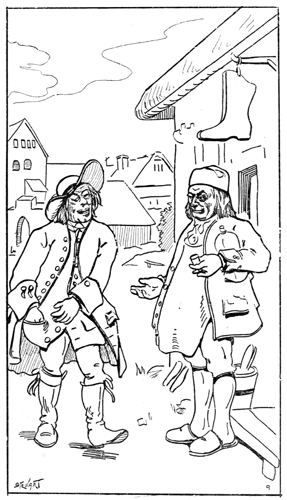
"Can't you trust me? I'm an honest man."
JEPPE ON THE HILL
OR
THE TRANSFORMED PEASANT
A COMEDY IN FIVE ACTS
TRANSLATED FROM THE DANISH
OF LUDVIG HOLBERG
BY
WALDEMAR C. WESTERGAARD
AND
MARTIN B. RUUD
WITH A BIOGRAPHICAL SKETCH OF HOLBERG BY MORRIS
JOHNSON AND AN INTRODUCTION BY
W. C. WESTERGAARD
FIRST PLAYED IN COPENHAGEN IN 1722
WITH ILLUSTRATIONS
PUBLISHED BY THE MIMER CLUB OF THE UNIVERSITY
OF NORTH DAKOTA
1906
THE EVENING TIMES COMPANY
GRAND FORKS, N. D.
Copyrighted 1906 by
W. C. WESTERGAARD
LUDVIG HOLBERG
In the fifteenth and sixteenth centuries two great spiritual movementsspread over Europe, the Renaissance and the Reformation. The former wasconfined principally to southern Europe, and did not influence the lifeor literature of the Scandinavian countries to any great extent. TheReformation, however, caused a new tho brief literary era, especially inDenmark, where the mother tongue was again accorded its proper place,and the people again began to think of a national future.
Much had conspired to make the people of Europe lose faith in the oldideas. Copernicus had demonstrated that the earth was only a planet inan immense system, and Kepler and Galileo had taught that the earthcircled about the sun, and that there was order and regularity in themovements of the heavenly bodies. Finally Newton announced his principlethat the law of gravitation governed each and every one of thesemovements. All this together with the geographical discoveries ofColumbus, Magellan, De Gama and others, revolutionized people's ideas ofthe universe and of the earth.
In December, 1684, just two weeks before Newton gave his first publiclecture explaining his discovery, a child who was destined to become thefounder of the Danish-Norwegian literature was born in Bergen, Norway.That child was Ludvig Holberg. His parents died while the boy was but afew years old, and he was brought up by relatives. Too weakly and smallto become a military man as his father had been, he was sent to the"Latin School" at Bergen. Eighteen years old he became a student at theUniversity of Copenhagen. Two years later he became a student oftheology. Lack of means compelled him to return to Bergen as a privatetutor. But he soon determined to travel, and with a small sum of moneyhe set out for Amsterdam.[Pg vi] After considerable sickness and misfortune hereturned to Norway. In 1706 there followed a journey to England, wheretwo years were spent, largely in study at Oxford. Later he made fourother journeys to foreign countries. Two years were spent in France, andabout a year in Italy.
What were the conditions under which Holberg grew up? And what did heexperience abroad? Turning to Denmark we find the religious, politicaland educational status very low. We can get an idea of the prevailingnature of government when we learn that Christian the Sixth was spokenof in a university address as a king whom God himself "fills with hiswisdom, honors with his friendship, strengthens by his teachings,satisfies with his communications, perfects with Divine power, a manwith whom he shares His creative strength, one who is beautified byGod's image," and "whose plans evolve from the thoughts of theAlmighty!"
In the religious field, conditions were no better. Intolerance andpersecution were the